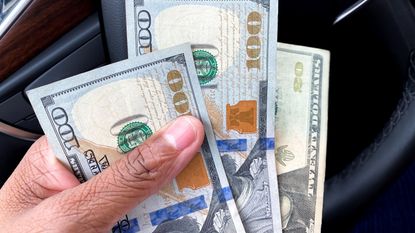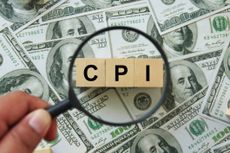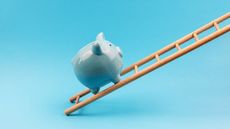How Much Cash You Really Need
Determine how much cash you need in case of an emergency.

In every stage of life, having a financial cushion (cash on hand) can prepare you for potential emergencies and provide some peace of mind.
While most experts recommend maintaining three to six months' worth of basic living expenses in an emergency fund, the amount of cash you really need depends on a few factors, including your current life and financial situation, your risk tolerance and your goals.
Consider your situation
Determining how much money you need depends largely on your current financial needs and risks.

Sign up for Kiplinger’s Free E-Newsletters
Profit and prosper with the best of expert advice on investing, taxes, retirement, personal finance and more - straight to your e-mail.
Profit and prosper with the best of expert advice - straight to your e-mail.
"If you're single, you might be comfortable with less than six months of savings," said Carl Holubowich, CFP, principal at D.C.-based financial planner, Armstrong, Fleming and Moore. "But if you have a spouse, kids and a mortgage, or if you worry about replacing a lost job or other income quickly, you likely need six months or even more."
Putting more cash in savings, like one of the best high-yield savings accounts, is also a good idea for prospective homebuyers who want to establish a sizable down payment, which is especially important as 30-year mortgage rates are still high.
If you're nearing retirement, you may want more than the standard six-month requirement to preserve the wealth you've built in case there's a bear market and your investments don't meet your expectations.
"Keeping two- or three-years’ worth of expenses can provide a safety net to help get you through a down stock market," says Holubowich.
Evaluate your risk tolerance
Consider the degree of risk you're willing to endure. The term is generally used for investors who can experience a lot of short-term volatility with their investment portfolios, but it can also apply to emergency savings.
If you tend to feel a lot of anxiety about a potential job loss or other major financial emergency, it may make sense to save more money to put your mind at ease. But if you're less worried about emergency expenses that may or may not happen, and you'd rather use your money for other financial goals, a smaller emergency fund may be a good fit for you.
Align your savings with your goals
While a solid emergency fund is important for managing financial risks, it's just one aspect of your overall financial plan. Depending on your cash flow, you may be able to work toward multiple savings goals at the same time, or you may need to prioritize one goal at a time.
The key is to consider the benefits of all of your financial goals to determine how to manage your money more effectively.
If your employer offers a 401(k), complete with a contribution match, for instance, it may make sense to maximize that match instead of putting that money into a savings account because it's essentially a 100% return on your investment and can accelerate your retirement savings plan.
If you have high-interest credit card debt, it could be a good idea to build up a small emergency fund to give you a buffer, then tackle your debt to free up more cash flow once you pay off your card's debt.
Determine hard numbers for your situation
As you consider your current situation, risk tolerance and goals, come up with a figure for cash on hand that will give you peace of mind. You may land on this number based on your monthly income or basic necessities, or you may simply use a flat amount that makes you comfortable.
Whatever you do, take your time to understand your situation, so you can come up with an amount that works best for you.
Related Content

To continue reading this article
please register for free
This is different from signing in to your print subscription
Why am I seeing this? Find out more here
Get Kiplinger Today newsletter — free
Profit and prosper with the best of Kiplinger's advice on investing, taxes, retirement, personal finance and much more. Delivered daily. Enter your email in the box and click Sign Me Up.

Ben writes about all things personal finance, including consumer credit, credit cards, mortgages, student loans, investing and budgeting, as well as travel. Before his career as a writer, Ben worked in financial planning and insurance, banking and auto financing. After working as a staff writer at NerdWallet and Student Loan Hero, he started freelancing full time in 2018. Ben earned a B.S. in business administration with a finance emphasis from Brigham Young University. He lives near Salt Lake City with his two kids and two cats.
-
 Target to Stop Accepting Personal Checks, But Is the Checkbook Era Really Over?
Target to Stop Accepting Personal Checks, But Is the Checkbook Era Really Over?Target won’t accept personal checks after July 15, following Aldi and Whole Foods Market in ditching the payment method. But while they're on the decline, checks still hold value for some Americans.
By Charlotte Gorbold Published
-
 Stock Market Today: Markets Mixed as Rising Rate-Cut Bets Boost Small Caps
Stock Market Today: Markets Mixed as Rising Rate-Cut Bets Boost Small CapsA surprisingly soft inflation report sparked a rotation from mega-caps into riskier names.
By Dan Burrows Published
-
 Target to Stop Accepting Personal Checks, But Is the Checkbook Era Really Over?
Target to Stop Accepting Personal Checks, But Is the Checkbook Era Really Over?Target won’t accept personal checks after July 15, following Aldi and Whole Foods Market in ditching the payment method. But while they're on the decline, checks still hold value for some Americans.
By Charlotte Gorbold Published
-
 June CPI Report Comes in Soft: What the Experts Are Saying About Inflation
June CPI Report Comes in Soft: What the Experts Are Saying About InflationCPI Odds rise for a September rate cut after prices fall on a monthly basis for the first time in almost two years.
By Dan Burrows Published
-
 Costco Raises Membership Fees For First Time Since 2017
Costco Raises Membership Fees For First Time Since 2017Costco is raising its membership prices for the first time in nearly seven years. Here’s what you need to know.
By Joey Solitro Published
-
 Try Swimply, the Airbnb of Pools, and Rent a Luxury Pool This Summer
Try Swimply, the Airbnb of Pools, and Rent a Luxury Pool This SummerWith Swimply, you can live it up at a luxury pool while escaping the heat and going for a swim.
By Erin Bendig Published
-
 10 Money-Saving Hacks for Amazon Shoppers
10 Money-Saving Hacks for Amazon ShoppersThere are many money-saving hacks for Amazon shoppers if you know how to use them.
By Kathryn Pomroy Published
-
 Amazon Prime Day vs Walmart Deal Days: Which Is Better?
Amazon Prime Day vs Walmart Deal Days: Which Is Better?From household goods and clothing to electronics and toys, which retail giant is the clear winner? The answer may be both.
By Kathryn Pomroy Published
-
 Take a Mid-Year Review of Your Health Insurance Coverage
Take a Mid-Year Review of Your Health Insurance CoverageWhether it's monitoring your deductible or using a health savings account, here are the best ways to maximize use of your health insurance coverage
By Kimberly Lankford Published
-
 Now's a Great Time to Build a Bond Ladder
Now's a Great Time to Build a Bond LadderNavigating how to proceed with new or rollover money can be daunting. Here are some of the best ways to guarantee a high yield to maturity and full recovery of principal.
By Jeffrey R. Kosnett Published